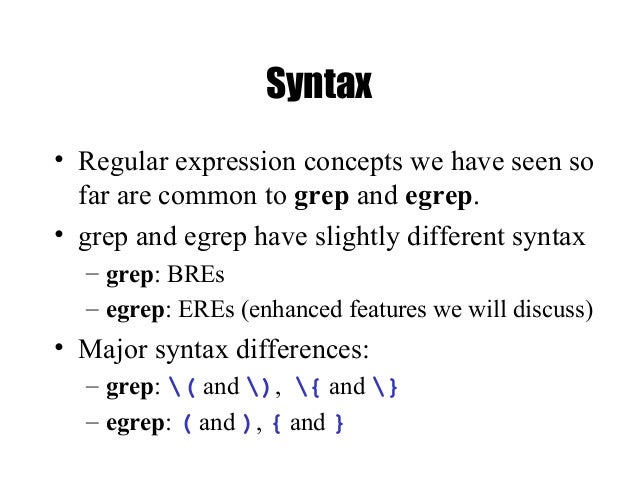

These restrictions are made possible by assigning special meaning to certain characters and escape sequences.
#Grep regular expression how to
In later sections and chapters, you'll get to know how to define your own rules for restriction. For now, you'll see the ones that are already part of BRE/ERE. Instead of matching anywhere in the line, restrictions can be specified. The directory for this chapter is bre_ere.
#Grep regular expression free
If you have any questions or feedback, feel free to leave a comment.This chapter will cover Basic and Extended Regular Expressions as implemented in GNU grep. Knowing how to construct regular expressions can be very helpful when searching text files, writing scripts, or filtering command output. Regular expressions are used in text editors, programming languages, and command-line tools such as grep, sed, and awk. It will not match the words if embedded in larger words: grep '\bbject\b' file.txt Conclusion The following pattern will match separate words “abject” and “object”. Match an empty string at the end of a word. The following table shows some of the most common special backslash expressions: Expression GNU grep includes several meta-characters that consist of a backslash followed by a regular character.

The ? quantifier makes the (fear) group optional: grep -E '(fear)?less' file.txt Special Backslash Expressions

The following example matches both “fearless” and “less”. When using basic regular expressions, the parenthesis must be escaped with a backslash ( \). Grouping is a feature of the regular expressions that allows you to group patterns together and reference them as one item. If you use the extended regular expression, then the operator | should not be escaped, as shown below: grep -E 'fatal|error|critical' /var/log/nginx/error.log Grouping In the example below, we are searching for all occurrences of the words fatal, error, and critical in the Nginx log error file: grep 'fatal\|error\|critical' /var/log/nginx/error.log This operator has the lowest precedence of all regular expression operators. The alternation operator | (pipe) allows you to specify different possible matches that can be literal strings or expression sets. The only difference is that in basic regular expressions the meta-characters ?, +, ' file.txt Alternation In GNU’s implementation of grep there is no functional difference between the basic and extended regular expression syntaxes. To interpret the pattern as an extended regular expression, use the -E ( or -extended-regexp) option. In its simplest form, when no regular expression type is given, grep interpret search patterns as basic regular expressions. GNU grep supports three regular expression syntaxes, Basic, Extended, and Perl-compatible. A pattern consists of operators, constructs literal characters, and meta-characters, which have special meaning. Grep Regular ExpressionĪ regular expression or regex is a pattern that matches a set of strings. In this article, we’re going to explore the basics of how to use regular expressions in the GNU version of grep, which is available by default in most Linux operating systems. grep searches one or more input files for lines that match a regular expression and writes each matching line to standard output. Grep is one of the most useful and powerful commands in Linux for text processing.


 0 kommentar(er)
0 kommentar(er)
